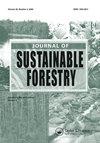森林火灾对森林生态系统碳、氮、磷生态化学计量特征影响的研究进展
IF 1.8
4区 农林科学
Q3 FORESTRY
引用次数: 0
摘要
森林火灾可以改变森林生态系统元素的生态化学计量特征,反映火灾后森林生态系统环境的生物地球化学循环变化模式,阐明森林火灾扰动下森林生态系统中碳(C)、氮(N)、磷(P)的生态化学计量特征,这对理解森林生态系统对森林火灾扰动的响应机制具有重要意义。通过查阅大量相关文献,总结分析了森林火灾干扰对森林生态系统C-N-P生态化学计量特征的影响模式,以及森林火灾干扰对植物C-N-P生态化学计量特征、凋落物C-N-P生态化学计量特征、土壤C-N-P生态化学计量特征的影响。认为森林生态系统C-N-P生态化学计量特征主要受火灾因子(火灾强度、火灾频率、火灾后恢复时间)、植被类型和土壤性质的影响。针对森林火灾在森林生态系统生态化学计量学研究中急需解决的科学问题,从三个方面:提出了林火干扰对植物生态化学计量动态平衡的影响机制,研究林火干扰下的多元素生态化学计量,建立林火干扰下植物-凋落物-土壤复合系统的生态化学计量关系,以期深入了解林火干扰下的植物调控策略。阐明森林火灾干扰后多种化学元素之间的相互耦合机制,完善地上、地下养分投入产出与植物-凋落物-土壤作为一个复合整体的关系,对于深入了解全球气候变化背景下森林生态系统的养分循环与平衡,合理制定森林火灾管理措施具有重要意义。本文章由计算机程序翻译,如有差异,请以英文原文为准。
Research progress on the influence of forest fire on the eco-stoichiometric characteristics of carbon, nitrogen and phosphorus in forest ecosystem
Forest fire can change the eco-stoichiometric characteristics of forest ecosystem elements, reflect the biogeochemical cycle change mode of forest ecosystem environment after fire, and clarify the eco-stoichiometric characteristics of carbon (C), nitrogen (N), phosphorus (P) in forest ecosystem under forest fire disturbance, which is very important for understanding the response mechanism of forest ecosystem to forest fire disturbance. By consulting a large number of relevant literatures, the author summarized and analyzed the impact mode of forest fire disturbance on the C–N–P eco-stoichiometric characteristics of forest ecosystem, as well as the impact of forest fire disturbance on the C–N–P eco-stoichiometric characteristics of plants, C–N–P eco-stoichiometric characteristics of litter, and C–N–P eco-stoichiometric characteristics of soil. It is considered that the C–N–P eco-stoichiometric characteristics of forest ecosystem are mainly affected by fire factors (fire intensity, fire frequency, recovery time after fire), vegetation types and soil properties. In view of the scientific problems that forest fire urgently needs to be solved in the study of forest ecosystem eco-stoichiometry, three aspects: the impact mechanism of forest fire disturbance on the homeostasis of plant eco-stoichiometry, the study of multi-element eco-stoichiometry under forest fire disturbance, the establishment of the eco-chemometrics relationship of the plant–litter–soil composite system under the interference of forest fire are proposed, in order to deeply understand the plant regulation strategy under the interference of forest fire, clarify the mutual coupling mechanism between multiple chemical elements after the interference of forest fire, and improve the relationship between the input and output of aboveground and underground nutrients with the plant–litter–soil as a composite whole, which is of great significance for a deep understanding of the nutrient cycle and balance of the forest ecosystem under the background of global climate change, and reasonable formulation of forest fire management measures.
求助全文
通过发布文献求助,成功后即可免费获取论文全文。
去求助
来源期刊

Journal of Sustainable Forestry
Social Sciences-Geography, Planning and Development
CiteScore
3.90
自引率
12.50%
发文量
42
期刊介绍:
Journal of Sustainable Forestry publishes peer-reviewed, original research on forest science. While the emphasis is on sustainable use of forest products and services, the journal covers a wide range of topics from the underlying biology and ecology of forests to the social, economic and policy aspects of forestry. Short communications and review papers that provide a clear theoretical, conceptual or methodological contribution to the existing literature are also included in the journal.
Common topics covered in the Journal of Sustainable Forestry include:
• Ecology, management, recreation, restoration and silvicultural systems of all forest types, including urban forests
• All aspects of forest biology, including ecophysiology, entomology, pathology, genetics, tree breeding, and biotechnology
• Wood properties, forest biomass, bioenergy, and carbon sequestration
• Simulation modeling, inventory, quantitative methods, and remote sensing
• Environmental pollution, fire and climate change impacts, and adaptation and mitigation in forests
• Forest engineering, economics, human dimensions, natural resource policy, and planning
Journal of Sustainable Forestry provides an international forum for dialogue between research scientists, forest managers, economists and policy and decision makers who share the common vision of the sustainable use of natural resources.
 求助内容:
求助内容: 应助结果提醒方式:
应助结果提醒方式:


